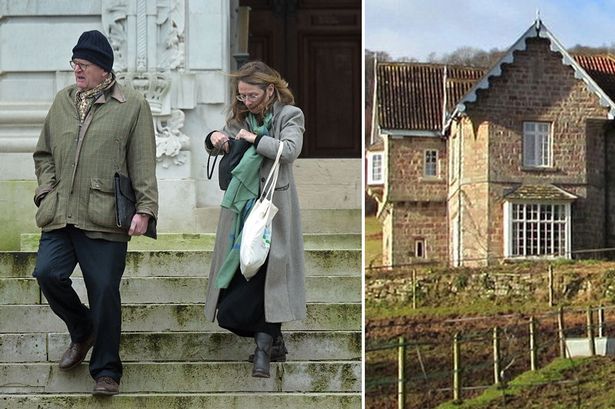The picturesque grounds of a sprawling £2.5 million mansion in the affluent countryside have become the unexpected backdrop for a tragic legal battle. Nicholas Prest, a 71-year-old former defence chief, and his wife Anthea, 70, stand accused of responsibility in the death of Paul Marsden, a gardener employed to maintain the expansive property. Both vehemently deny any culpability in the incident, setting the stage for a complex and emotionally charged legal proceeding. The case revolves around the circumstances surrounding Marsden’s death, with the prosecution alleging negligence on the part of the Prests, while the defence maintains that the gardener’s actions were the sole cause of the tragedy. The substantial wealth and prominent social standing of the defendants, coupled with the tragic loss of a working-class individual, have imbued the case with an element of David versus Goliath, attracting considerable public attention and media scrutiny.
The details surrounding the incident remain shrouded in some ambiguity, pending the full court proceedings. However, the core of the prosecution’s argument rests on the assertion that the Prests failed to maintain a safe working environment for Marsden. This could encompass a range of potential failures, from inadequate safety training and supervision to the presence of hazardous conditions on the property. The specific nature of these alleged failings, and the extent to which they contributed to Marsden’s death, will be central points of contention during the trial. The defence, meanwhile, is expected to argue that Marsden acted independently and against instructions, or perhaps exhibited a degree of negligence himself, ultimately bearing the sole responsibility for the tragic outcome. The courtroom will become a battleground of contrasting narratives, with each side vying to establish their version of events as the definitive truth.
The case raises broader questions about the responsibilities landowners and employers bear towards those working on their properties. While the legal specifics will depend on the specific circumstances of Marsden’s death, the trial will inevitably touch upon the broader themes of workplace safety, duty of care, and the potential consequences of failing to uphold these responsibilities. The outcome will likely have implications beyond this specific case, potentially influencing future legal interpretations and strengthening or weakening existing regulations concerning employer liability. The high profile nature of the defendants will further amplify the impact of the verdict, sending a message about the level of accountability expected from those in positions of power and privilege.
The human element of this tragedy cannot be overlooked. Paul Marsden’s death represents a profound loss for his family and friends, who undoubtedly seek justice and closure. Their grief is compounded by the complex legal proceedings, which force them to relive the painful details of the incident and confront the individuals they believe responsible. For the Prests, the trial represents not only a legal challenge but also a potential threat to their reputation and social standing. The accusation of negligence hangs heavy over them, even as they maintain their innocence. The courtroom will become a crucible, testing the strength of their defence and exposing them to intense public scrutiny.
Beyond the immediate legal and personal ramifications, this case highlights the often-uneasy relationship between different social strata. The stark contrast between the wealthy landowners and the working-class gardener inevitably raises questions about power dynamics and the potential for exploitation. While the legal proceedings will focus on specific allegations of negligence, the underlying social context will inevitably inform public perception of the case. The trial will, in a sense, become a microcosm of broader societal tensions, reflecting anxieties surrounding wealth inequality and the perceived imbalance of power between employers and employees.
The upcoming trial promises to be a complex and emotionally charged affair. The legal arguments will delve into the intricacies of negligence law, dissecting the circumstances of Marsden’s death in minute detail. The courtroom will become a stage for conflicting narratives, as the prosecution and defence present their competing versions of events. Beyond the legal intricacies, however, lies a human tragedy: the loss of a life and the profound grief of those left behind. The case also serves as a stark reminder of the responsibilities landowners and employers bear towards those who work for them and the potential consequences of failing to uphold those responsibilities. The verdict, when it finally comes, will have far-reaching implications, impacting not only the individuals directly involved but also potentially shaping future legal interpretations and influencing public discourse on workplace safety and employer accountability.














